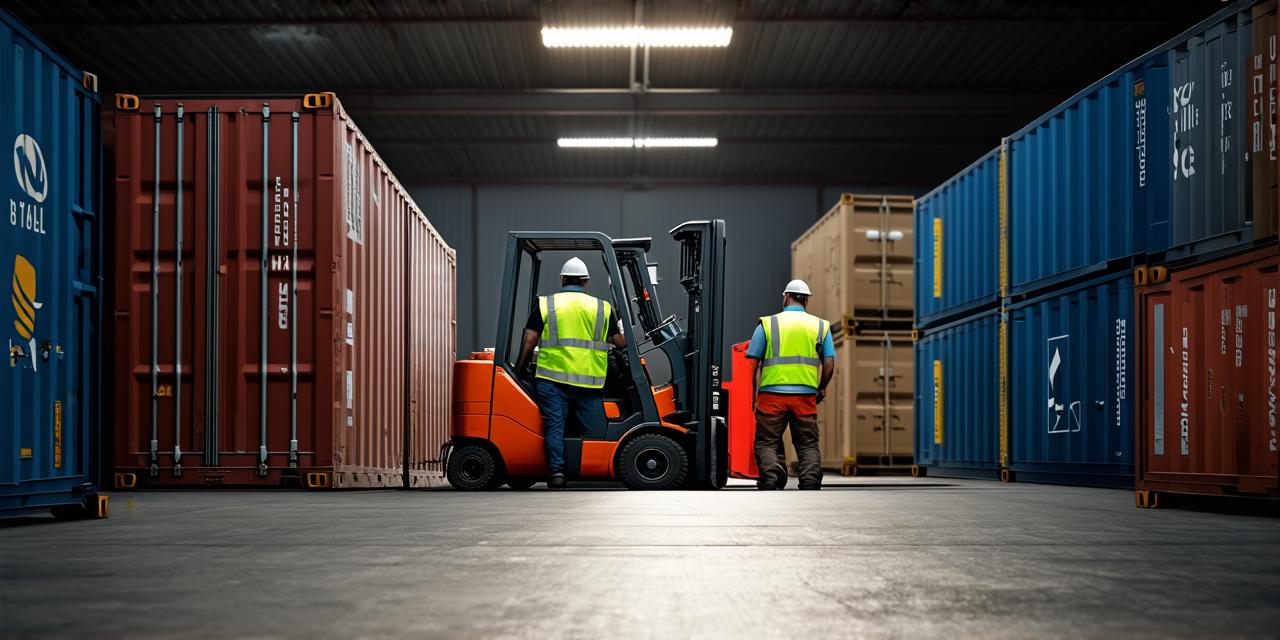Introduction
Logistics companies play a crucial role in the smooth functioning of businesses across various industries. These companies are responsible for managing the movement and storage of goods, as well as ensuring timely delivery to customers.
Function 1: Warehousing and Distribution
Warehousing and distribution are two of the primary functions of a logistics company. Warehouses serve as storage facilities for goods, where they can be safely stored and managed until they are needed for delivery. Logistics companies also distribute these goods to various locations, ensuring that they reach their intended destination on time and in good condition.
For instance, consider the case of Amazon, one of the world’s largest e-commerce retailers. Amazon relies heavily on logistics companies to store and distribute its products across the globe. The company has built a vast network of warehouses and distribution centers, which enable it to quickly and efficiently deliver goods to customers in different parts of the world.
Function 2: Transportation Management
Transportation management is another critical function of logistics companies. These companies are responsible for managing the transportation of goods from one location to another, ensuring that they arrive at their destination safely and on time. This involves coordinating with various modes of transportation, such as trucks, ships, and airplanes, to ensure that goods are delivered efficiently.
For example, consider the case of DHL, a leading logistics company that offers a range of transportation services, including air, sea, and road transportation. DHL uses its vast network of transportation facilities and vehicles to deliver goods to customers across the globe quickly and efficiently.
Function 3: Inventory Management

Inventory management is another important function of logistics companies. These companies are responsible for managing the stock levels of goods, ensuring that there is enough inventory to meet customer demand while avoiding overstocking and excess inventory. This involves closely monitoring sales data, demand forecasts, and other factors to ensure that inventory levels are optimized for maximum efficiency.
For instance, consider the case of Walmart, one of the world’s largest retailers. Walmart relies heavily on logistics companies to manage its inventory levels, ensuring that it has enough stock to meet customer demand while avoiding overstocking and excess inventory. The company uses a range of tools and technologies, including advanced analytics and predictive modeling, to optimize its inventory management processes.
Function 4: Order Fulfillment
Order fulfillment is another critical function of logistics companies. These companies are responsible for processing and shipping orders to customers, ensuring that they arrive at their destination on time and in good condition. This involves coordinating with various systems and processes, such as order management, payment processing, and shipping, to ensure that orders are fulfilled efficiently.
For example, consider the case of Zappos, an online shoe and clothing retailer. Zappos relies heavily on logistics companies to fulfill its orders, ensuring that customers receive their purchases quickly and efficiently. The company uses a range of tools and technologies, including advanced order management systems and real-time tracking, to optimize its order fulfillment processes.
Function 5: Supply Chain Management
Supply chain management is another important function of logistics companies. These companies are responsible for managing the entire supply chain, from sourcing raw materials to delivering finished products to customers. This involves coordinating with various suppliers, manufacturers, and distributors to ensure that the supply chain runs smoothly and efficiently.
For instance, consider the case of Toyota, one of the world’s largest automakers. Toyota relies heavily on logistics companies to manage its supply chain, ensuring that it has access to the raw materials and components it needs to build cars quickly and efficiently. The company uses a range of tools and technologies, including advanced demand forecasting and inventory management systems, to optimize its supply chain processes.
FAQs
1. What are the primary functions of logistics companies?
Warehousing and distribution, transportation management, inventory management, order fulfillment, and supply chain management are the primary functions of logistics companies.
2. How do logistics companies contribute to the growth and success of businesses?
Logistics companies contribute to the growth and success of businesses by managing the movement and storage of goods, ensuring timely delivery to customers, optimizing inventory levels, fulfilling orders efficiently, and managing the entire supply chain.
3. What are some examples of logistics companies that provide transportation services?
DHL, FedEx, UPS, and USPS are some examples of logistics companies that provide transportation services.
4. How do logistics companies optimize their inventory management processes?
Logistics companies optimize their inventory management processes by closely monitoring sales data, demand forecasts, and other factors to ensure that inventory levels are optimized for maximum efficiency. They also use advanced analytics and predictive modeling tools to forecast demand and optimize stocking levels.
5. What are some examples of logistics companies that provide supply chain management services?
Toyota, Amazon, Walmart, and Apple are some examples of logistics companies that provide supply chain management services.
Summary
Logistics companies play a crucial role in the smooth functioning of businesses across various industries. These companies are responsible for managing the movement and storage of goods, as well as ensuring timely delivery to customers. By optimizing their processes and utilizing advanced technologies, logistics companies can contribute significantly to the growth and success of businesses. As such, it is important for businesses to partner with reliable and efficient logistics companies to ensure the smooth functioning of their operations.


